Real eState
Real Estate Can Be Your Solution in 2021 – Entrepreneur

November
26, 2020
6 min read
Opinions expressed by Entrepreneur contributors are their owns.
As we enter the homestretch of perhaps the most turbulent year of our lifetimes, it’s hard not to ask the major questions: How did we get here? How can we fix it? And what does the future hold?
In March, virtually the entire US economy shut down as the world grappled with the Covid-19 pandemic. Companies around the country were forced to close their offices, quickly implementing work-from-home policies for non-essential workers; and many of those policies remain in effect for the foreseeable future, as organizations continue to prioritize their workers’ health and safety. The closing of offices and need for social distancing simultaneously caused a mass exodus from major US cities like New York, San Francisco and Los Angeles, with suburban markets experiencing a boom as a result. And systemic racism — highlighted in recorded acts of police brutality, violence and injustice — spurred widespread, national protests and ignited a sense of responsibility for many Americans.
So what does real estate have to do with this, you might ask? PwC and Urban Land Institute recently published a new report, “Emerging Trends in Real Estate 2021,” which highlights the ways the pandemic will change how property is bought, sold and used. Perhaps one of the most interesting takeaways from the report is “Housing as a solution — for people, for communities, and for societal repair” — and the way real estate will emerge as one of the coming decade’s forefront business opportunities.
In this article, we examine some the report’s findings, including the opportunities for housing and real estate to emerge as a solution for afflicted individuals, communities and society at large.
Related: Here Are Real Estate’s Winners and Losers In the New Normal
Real estate as a solution for individuals
When examining recent trends from an individual perspective — for buyers and sellers of single-family properties — Covid-19 has impacted everything. According to the PwC and Urban Land Institute report, “listings during the first half of 2020 declined,” with many homeowners fearful of inviting contagious disease through their doors during showings and open houses. But the second half of 2020 has seen a boom in both listings and sales, particularly in suburban areas. The report goes on to suggest that the months spent adjusting to social distancing, working from home and sheltering in place, “emerged as one of COVID-19’s wild-card forces, tripping thoughts to motivations, tripping interest to pursuit, and tripping new-home purchases into a higher gear.”
Individuals and families are shifting into planning mode. Looking ahead, they are thinking about their living space in terms of both personal and professional comfort, as well as safety. This shift in focus has undoubtedly impacted the homebuilding and construction sectors, which despite logistical challenges due to the pandemic, experienced booms in the warmer months as families and individuals continued to seek home upgrades ahead of the colder months.
Technologies like Punch List, which enables seamless, contact-free communication, progress tracking, project approval and payment via a mobile app, have made the process easier and safer for both contractors and homeowners. If anything, the pandemic has cemented the importance of “home” for many Americans, as home has become not just where we sleep and eat, but also where we work, where our children learn and where our in-laws and even adult children can stay safe. At Punch List, we’ve witnessed a continued increase in bathroom and kitchen renovation projects, as well as upgrades to indoor/outdoor space, in-law suites and home-offices. Homeowners and contractors are doing what they can to prepare for the uncertainty of this winter with home purchases and upgrades that will help keep everyone safe.
Related: 3 Reasons to Invest in Real Estate Right Now
Real estate as a solution for communities
For larger developments, living communities, and multifamily enterprises, the need for social distancing has caused a massive shift in focus and outlook. Amenities like community pools, fitness centers, theaters, and game rooms were a top selling point for these developments — until recently, when the health and safety of residents became top priority. Then there is the pandemic’s economic effect on vulnerable populations, who can’t afford to contribute a large percentage of their income toward rent.
As the pandemic has decreased the popularity of community living, many developers and investors have temporarily hit pause on large development projects, both in major cities and suburban markets.
But pausing is not the answer. As an industry, real estate needs to better address the needs of working-class families and individuals with secure, affordable communities — focusing less on amenities and more on health and safety.
As the PwC and Urban Land Institute report indicates, “The pandemic’s lens could favorably alter the conversation. For instance, in light of the likely need for a New Deal–style work, training, and economic vitalization megaprogram, might housing — especially multifamily rental communities for working-class families and individuals — qualify as infrastructure?” It’s certainly a solution worth considering.
Related: 3 Factors Driving Real Estate Investment in 2020
Real estate as a solution for society
As I pointed out earlier, 2020 has been trying — both due to the pandemic, and the police brutality and violence that highlighted our society’s ingrained systemic racism. It is our responsibility as a society to do better. According to the 2021 Emerging Trends survey, only 25 percent of respondents agreed with the statement, “I believe that the real estate industry understands how past policies and practices may have contributed to systemic racism.” We need to educate ourselves and take an objective look at how the real estate industry, lenders and the government share responsibility for historic redlining and segregation across the United States.
Per the report, “Many interviewees suggested that the real estate industry could be more proactive in creating and supporting neighborhoods that are racially and socioeconomically integrated, and reversing the impact of de jure segregation, as well as investing more in areas that have been overlooked and that have suffered from perpetual and deliberate disinvestment. Institutional investors are increasing commitments to ‘impact investing,’ and real estate investments that address racial inequality are a key target.”
Let’s challenge ourselves to be more proactive in addressing the wellbeing of our society — and in promoting racial equality within the real estate industry, starting with housing. We can and should be part of the solution.

Real eState
Canada’s Best Cities for Renters in 2024: A Comprehensive Analysis

In the quest to find cities where renters can enjoy the best of all worlds, a recent study analyzed 24 metrics across three key categories—Housing & Economy, Quality of Life, and Community. The study ranked the 100 largest cities in Canada to determine which ones offer the most to their renters.
Here are the top 10 cities that emerged as the best for renters in 2024:
St. John’s, NL

St. John’s, Newfoundland and Labrador, stand out as the top city for renters in Canada for 2024. Known for its vibrant cultural scene, stunning natural beauty, and welcoming community, St. John’s offers an exceptional quality of life. The city boasts affordable housing, a robust economy, and low unemployment rates, making it an attractive option for those seeking a balanced and enriching living experience. Its rich history, picturesque harbour, and dynamic arts scene further enhance its appeal, ensuring that renters can enjoy both comfort and excitement in this charming coastal city.
Sherbrooke, QC
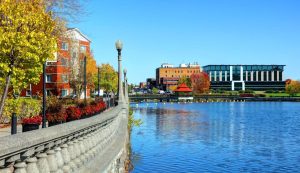
Sherbrooke, Quebec, emerges as a leading city for renters in Canada for 2024, offering a blend of affordability and quality of life. Nestled in the heart of the Eastern Townships, Sherbrooke is known for its picturesque landscapes, vibrant cultural scene, and strong community spirit. The city provides affordable rental options, low living costs, and a thriving local economy, making it an ideal destination for those seeking both comfort and economic stability. With its rich history, numerous parks, and dynamic arts and education sectors, Sherbrooke presents an inviting environment for renters looking for a well-rounded lifestyle.
Québec City, QC
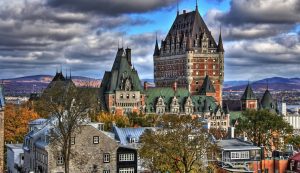
Québec City, the capital of Quebec, stands out as a premier destination for renters in Canada for 2024. Known for its rich history, stunning architecture, and vibrant cultural heritage, this city offers an exceptional quality of life. Renters benefit from affordable housing, excellent public services, and a robust economy. The city’s charming streets, historic sites, and diverse culinary scene provide a unique living experience. With top-notch education institutions, numerous parks, and a strong sense of community, Québec City is an ideal choice for those seeking a dynamic and fulfilling lifestyle.
Trois-Rivières, QC

Trois-Rivières, nestled between Montreal and Quebec City, emerges as a top choice for renters in Canada. This historic city, known for its picturesque riverside views and rich cultural scene, offers an appealing blend of affordability and quality of life. Renters in Trois-Rivières enjoy reasonable housing costs, a low unemployment rate, and a vibrant community atmosphere. The city’s well-preserved historic sites, bustling arts community, and excellent educational institutions make it an attractive destination for those seeking a balanced and enriching lifestyle.
Saguenay, QC

Saguenay, located in the stunning Saguenay–Lac-Saint-Jean region of Quebec, is a prime destination for renters seeking affordable living amidst breathtaking natural beauty. Known for its picturesque fjords and vibrant cultural scene, Saguenay offers residents a high quality of life with lower housing costs compared to major urban centers. The city boasts a strong sense of community, excellent recreational opportunities, and a growing economy. For those looking to combine affordability with a rich cultural and natural environment, Saguenay stands out as an ideal choice.
Granby, QC
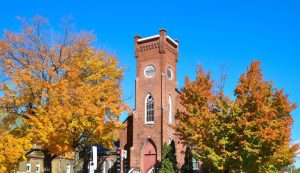
Fredericton, NB
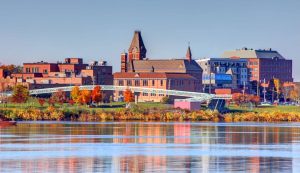
Saint John, NB
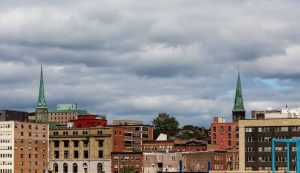
Saint John, New Brunswick’s largest city, is a coastal gem known for its stunning waterfront and rich heritage. Nestled on the Bay of Fundy, it offers renters an affordable cost of living with a unique blend of historic architecture and modern conveniences. The city’s vibrant uptown area is bustling with shops, restaurants, and cultural attractions, while its scenic parks and outdoor spaces provide ample opportunities for recreation. Saint John’s strong sense of community and economic growth make it an inviting place for those looking to enjoy both urban and natural beauty.
Saint-Hyacinthe, QC

Saint-Hyacinthe, located in the Montérégie region of Quebec, is a vibrant city known for its strong agricultural roots and innovative spirit. Often referred to as the “Agricultural Technopolis,” it is home to numerous research centers and educational institutions. Renters in Saint-Hyacinthe benefit from a high quality of life with access to excellent local amenities, including parks, cultural events, and a thriving local food scene. The city’s affordable housing and close-knit community atmosphere make it an attractive option for those seeking a balanced and enriching lifestyle.
Lévis, QC

Lévis, located on the southern shore of the St. Lawrence River across from Quebec City, offers a unique blend of historical charm and modern conveniences. Known for its picturesque views and well-preserved heritage sites, Lévis is a city where history meets contemporary living. Residents enjoy a high quality of life with excellent public services, green spaces, and cultural activities. The city’s affordable housing options and strong sense of community make it a desirable place for renters looking for both tranquility and easy access to urban amenities.
This category looked at factors such as average rent, housing costs, rental availability, and unemployment rates. Québec stood out with 10 cities ranking at the top, demonstrating strong economic stability and affordable housing options, which are critical for renters looking for cost-effective living conditions.
Québec again led the pack in this category, with five cities in the top 10. Ontario followed closely with three cities. British Columbia excelled in walkability, with four cities achieving the highest walk scores, while Caledon topped the list for its extensive green spaces. These factors contribute significantly to the overall quality of life, making these cities attractive for renters.
Victoria, BC, emerged as the leader in this category due to its rich array of restaurants, museums, and educational institutions, offering a vibrant community life. St. John’s, NL, and Vancouver, BC, also ranked highly. Québec City, QC, and Lévis, QC, scored the highest in life satisfaction, reflecting a strong sense of community and well-being. Additionally, Saskatoon, SK, and Oshawa, ON, were noted for having residents with lower stress levels.
For a comprehensive view of the rankings and detailed interactive visuals, you can visit the full study by Point2Homes.
While no city can provide a perfect living experience for every renter, the cities highlighted in this study come remarkably close by excelling in key areas such as housing affordability, quality of life, and community engagement. These findings offer valuable insights for renters seeking the best places to live in Canada in 2024.
Real eState
Former B.C. Realtor has licence cancelled, $130K in penalties for role in mortgage fraud

The provincial regulator responsible for policing B.C.’s real estate industry has ordered a former Realtor to pay $130,000 and cancelled her licence after determining that she committed a variety of professional misconduct.
Rashin Rohani surrendered her licence in December 2023, but the BC Financial Services Authority’s chief hearing officer Andrew Pendray determined that it should nevertheless be cancelled as a signal to other licensees that “repetitive participation in deceptive schemes” will result in “significant” punishment.
He also ordered her to pay a $40,000 administrative penalty and $90,000 in enforcement expenses. Pendray explained his rationale for the penalties in a sanctions decision issued on May 17. The decision was published on the BCFSA website Wednesday.
Rohani’s misconduct occurred over a period of several years, and came in two distinct flavours, according to the decision.
Pendray found she had submitted mortgage applications for five different properties that she either owned or was purchasing, providing falsified income information on each one.
Each of these applications was submitted using a person referred to in the decision as “Individual 1” as a mortgage broker. Individual 1 was not a registered mortgage broker and – by the later applications – Rohani either knew or ought to have known this was the case, according to the decision.
All of that constituted “conduct unbecoming” under B.C.’s Real Estate Services Act, Pendray concluded.
Separately, Rohani also referred six clients to Individual 1 when she knew or ought to have known he wasn’t a registered mortgage broker, and she received or anticipated receiving a referral fee from Individual 1 for doing so, according to the decision. Rohani did not disclose this financial interest in the referrals to her clients.
Pendray found all of that to constitute professional misconduct under the act.
‘Deceptive’ scheme
The penalties the chief hearing officer chose to impose for this behaviour were less severe than those sought by the BCFSA in the case, but more significant than those Rohani argued she should face.
Rohani submitted that the appropriate penalty for her conduct would be a six-month licence suspension or a $15,000 discipline penalty, plus $20,000 in enforcement expenses.
For its part, the BCFSA asked Pendray to cancel Rohani’s licence and impose a $100,000 discipline penalty plus more than $116,000 in enforcement expenses.
Pendray’s ultimate decision to cancel the licence and impose penalties and expenses totalling $130,000 reflected his assessment of the severity of Rohani’s misconduct.
Unlike other cases referenced by the parties in their submissions, Rohani’s misconduct was not limited to a single transaction involving falsified documents or a series of such transactions during a brief period of time, according to the decision.
“Rather, in this case Ms. Rohani repetitively, over the course of a number of years, elected to personally participate in a deceptive mortgage application scheme for her own benefit, and subsequently, arranged for her clients to participate in the same deceptive mortgage application scheme,” the decision reads.
Pendray further noted that, although Rohani had been licensed for “a significant period of time,” she had only completed a small handful of transactions, according to records from her brokerage.
There were just six transactions on which her brokerage recorded earnings for her between December 2015 and February 2020, according to the decision. Of those six, four were transactions that were found to have involved misconduct or conduct unbecoming.
“In sum, Ms. Rohani’s minimal participation in the real estate industry as a licensee has, for the majority of that minimal participation, involved her engaging in conduct unbecoming involving deceptive practices and professional misconduct,” the decision reads.
According to the decision, Rohani must pay the $40,000 discipline penalty within 90 days of the date it was issued.

Real eState
Should you wait to buy or sell your home?

The Bank of Canada is expected to announce its key interest rate decision in less than two weeks. Last month, the bank lowered its key interest rate to 4.7 per cent, marking its first rate cut since March 2020.
CTV Morning Live asked Jason Pilon, broker of Record Pilon Group, whether now is the right time to buy or sell your home.
When it comes to the next interest rate announcement, Pilon says the bank might either lower it further, or just keep it as is.
“The best case scenario we’re seeing is obviously a quarter point. I think more just because of the job numbers that just came out, I think more people are just leading on the fact that they probably just gonna do it in September,” he said. “Either way, what we saw in June, didn’t make a big difference.”
Here are the pros of buying/ selling now:
Pilon suggests locking in the rate right now, if you don’t want to take a risk with interest rates going up in the future.
He says the environment is more predictable right now, noting that the home values are transparent, which is one of the benefits for home sellers.
“Do you want to risk looking at what that looks like down the road? Or do you want to have the comfort in knowing what your house is worth right now?” Pilon said.
And when it comes to buyers, he notes, the competition is not so fierce right now, noting that there are options to choose from.
“You’re in the driver seat right now,” he said while noting the benefits for buyers.
Here are the cons of buying/ selling now:
He says one of the cons would be locking in the rate right now, then seeing a rate cut in the future.
The competition could potentially become fierce, if the bank decides to cut the rate further more, he explained.
He notes that if that happens, the housing crisis will become even worse, as Canada is still dealing with low housing inventory.
An increase in competition would increase the prices of houses, he adds.
Selling or buying too quickly isn’t the best practice, he notes, suggesting that you should take your time and put some thought into it.
Despite all the pros and cons, Pilon says, real estate remains a good investment.
According to the latest Royal LePage House Price Survey for the second quarter of this year, the average home price in Canada is $824,300. That’s up 1.9 per cent from the same time last year, and up 1.5 per cent from the first quarter of 2024.
In the Ottawa Housing Market Report for June 2024, the average price of a home was up 2.4 per cent from this time last year to $686,535, but down 0.6 per cent from May 2024.
Experts believe many potential buyers are still hesitant of jumping into the housing market and waiting for another interest rate cut of 50 to 100 basis points.
“I don’t think it’s going to be the rush that we see in the past, because people are used to more of a conservative approach right now,” said Curtis Fillier, president of the Ottawa Real Estate Board. “I think there’s still a bit of a hold back, but I definitely do think with another rate cut, we’ll probably see a very positive fall market.”
With files from CTV News Ottawa’s Kimberly Fowler

-

 News9 hours ago
News9 hours agoAfter grind of MLS regular season, Toronto FC looks forward to Leagues Cup challenge
-

 News23 hours ago
News23 hours agoCanadaNewsMedia news July 26, 2024: B.C. crews wary of winds boosting wildfires
-

 News15 hours ago
News15 hours agoOntario expanding access to RSV vaccines for young children, pregnant women
-

 News10 hours ago
News10 hours agoIn President Milei’s sit-down with Macron, Argentina says the leaders get past soccer chant fallout
-

 News8 hours ago
News8 hours agoUmicore suspends construction of $2.76B battery materials plant in Ontario
-

 News23 hours ago
News23 hours agoPeople should stay inside, filter indoor air amid wildfire smoke, respirologist says
-

 News17 hours ago
News17 hours agoFederal grand jury charges short seller Andrew Left in $16M stock manipulation scheme
-

 News19 hours ago
News19 hours agoSuspected train sabotage, bad weather dampen spirits ahead of Paris opening ceremony





















